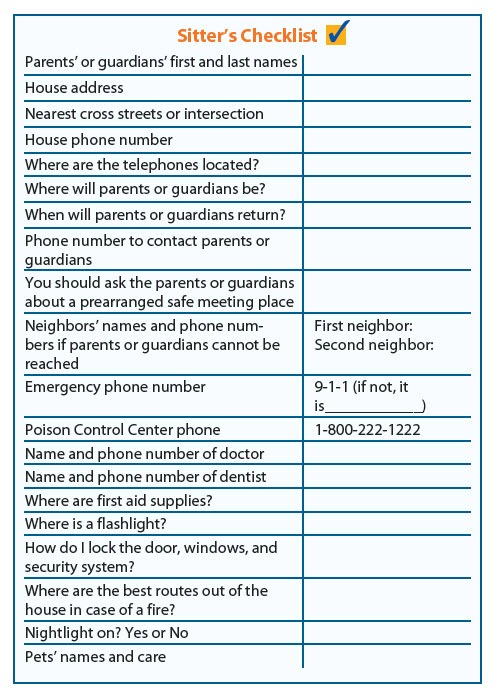Part of taking a sitting job seriously is protecting yourself as well as the children for whom you will be caring. Know the people you are sitting for before you take the job. Check references if this will be the first time working for this person.
Tips
- Get the parent's or guardian's name, address, and both home and cell phone numbers. Your parents or guardians may want to meet the people you are sitting for if they are not already acquainted.
- Get specific instructions about the number and ages of the children you will be sitting, their bed times, food allergies, medicines, and other information about their personal habits, and what is expected of you.
- Parents and guardians typically feel confident with a sitter who asks questions and is concerned about the care of their children. Discuss the information with your parents or guardians before accepting the job.
- Use the Sitter's Checklist
(see below).
 Safety Cautions
Safety Cautions
You may find enough jobs simply by letting friends and neighbors know that you are available to babysit. It is not a good idea to post flyers on supermarket bulletin boards or on the street, to place a classified ad in newspapers, or to have a website. You may receive some unwelcomed responses, and it may not be safe. Although most people are nice, do not make it easy for a stranger to find out your age, where you live, or your email address.
Accept jobs only from people you already know or from those who are recommended to you. Accepting jobs from strangers is not as safe as sitting for a neighbor or a neighbor's friend. If you do not know the person calling, ask who recommended you, and tell the caller that you will call him or her back. If you do not know the people you plan to sit for, bring a trusted adult (parent or guardians, adult friend, etc.) along for the interview. The adult is there for support and safety. You should answer any questions and be prepared to ask questions. If you have any doubt or feel uneasy or fearful about the person or situation, refuse the job. Other jobs will become available.
A Few Important Points
Let your parents or guardians know where and when you are sitting. Always leave the following information with them:
- Name, address, and phone number of the people for whom you are sitting.
- Time you will be brought home or need your parent, guardian, or other family member to pick you up from the sitting job.
- Arrange your own transportation to get to the location and to return home. If a family member is not picking you up, call home to let someone know that you are on your way.
-
Never accept rides from people who have been drinking alcohol or using drugs.
- Consider creating an agreed-on code word with your family so that if you say, for example, "giggles," they know to come get you right away.
- Be sure you have an escort home. This should be either a parent, guardian, or family member. Never go home alone from a night job.
- Learn how to use the electronic security system if the home has one.
- Let the parents or guardians for whom you are sitting know if you have a curfew. Ask them to call if they are running late.
- Call the child's parents or guardians about a problem such as the following:
- If a child has been crying for longer than 20 minutes and you can't figure out what's wrong.
- If a child develops a fever, vomits, or is injured (more than a superficial scrape).
- Anytime a situation develops that you feel you can't handle without help.
- Have a backup plan if you are unable to reach the child's parent. You should also call your own parents or guardians for advice and assistance if something arises.
